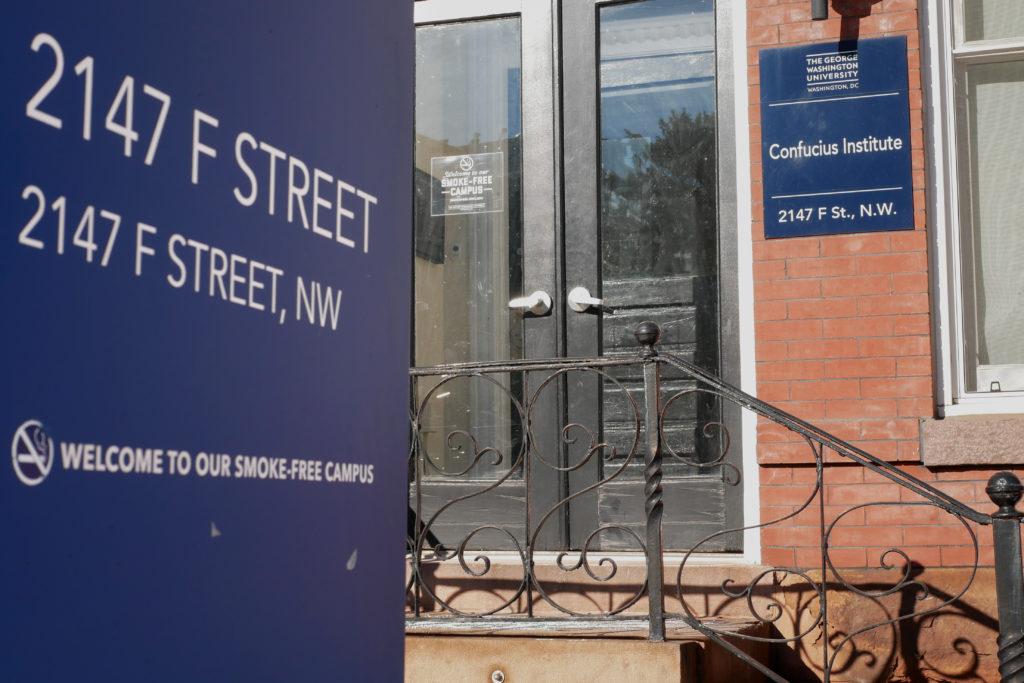Updated: Feb. 8, 2019 at 4:45 p.m.
After a year of condemnation from politicians and government agencies alike, GW’s Chinese government-funded center does not have any immediate plans to close.
Despite political pressure and the closures at least 10 Confucius Institutes nationwide over the past year and a half, University spokeswoman Lindsay Hamilton said officials are confident that GW’s center “operates in a manner fully consistent with the University’s values, policies and procedures – including our commitment to academic freedom.” Those involved in GW’s program and institutes around the country said recent political campaigns to shut down the centers often stem from a misunderstanding of what the institutes offer and how they operate.
“We evaluate our international programs and relationships regularly to ensure they are consistent with our educational mission, and we will continue to monitor and evaluate our Confucius Institute,” Hamilton said in an email.
GW’s Confucius Institute, a Chinese government-sponsored education center launched in 2013, is one of 104 of its kind throughout the United States. The center offers non-credit classes, educational programming and cultural events for students, faculty and staff.
But the centers have garnered criticism in and outside the government from those who believe the center gives China too much influence over American education and may harbor spies.
“Confucius Institutes are a key way the regime infiltrates American higher education to silence criticism and sanitize education about China,” Sen. Ted Cruz, R-Texas, told The Washington Post last August. “American taxpayer dollars should not be subsidizing their propaganda.”
Fifteen Confucius Institutes have shuttered across the United States since 2014, with nine closing their doors last year. One institute has closed so far in 2019, according to the National Association of Scholars.
Hamilton, the University spokeswoman, declined to say whether GW’s institute has considered closing its doors or if it has faced pressure to shut down. She also declined to comment on the criticisms from politicians about potential interference from the Chinese government. She declined to comment on the closures of other Confucius Institutes.
Hamilton also declined to comment on the FBI’s concern with the potential security risk the institutes pose. Christopher Wray, the director of the FBI, told a Senate panel last February that the bureau has been monitoring institutes throughout the country.
She declined to say how many students are involved with the institute or how much funding it receives from the University.
David Shambaugh, a professor of Asian Studies, Political Science and the director of the China Policy program, said that as long as the institutes focus on teaching Chinese and hosting cultural events, they are not violating academic freedom.
“While Confucius Institutes have become highly controversial across the country and abroad, my own assessment is that as long as they stay strictly to the teaching of Chinese language and culture and do not engage in programming or other activities outside of this narrow space, then they do not violate academic norms,” he said in an email.
He added the institutes should be fully transparent in describing their operations to the University and should welcome regular governance oversight.
Daqing Yang, an associate professor of history and international affairs who sits on the institute’s faculty advisory council, said that as a Chinese-born U.S. citizen, he understands the concern of foreign interference and agrees that oversight is necessary to avoid such a situation. But he said an overreaction to the concerns can also foster negative ideas about a positive center.
“Paranoia and over-reaction can do more harm than good,” he said. “They can end up violating the very principles we want to uphold – academic freedom as well as open exchange of ideas.”
Joseph Lam, the director of the Confucius Institute at the University of Michigan, Ann Arbor, said criticisms of the institutes are “political” and are rooted in misinformation. He said many people think that the centers only serve to promote China in a positive light, but in reality, they organize apolitical events like Chinese ballets and lectures.
He said closing institutes deprives students of cultural experiences they may not otherwise have an opportunity to engage in, like Chinese operas or performances. These experiences enhance college students’ education in the same way that a humanities curriculum would expand a traditional liberal arts education, he said.
“How much value would you put on students knowing Shakespeare dramas and music in life?” he said.
Anna Dunaway, the director of the now-closed Confucius Institute at North Carolina State University, said the institutes have often had trouble defending themselves because they could not coordinate. Individually, the centers could only defend themselves through press releases, but Dunaway said a unified front would have made the institutes’ case stronger.
Dunaway said she offered to give staff and faculty articles and other materials to better inform them about the institute’s mission. But often, most criticism would come from politicians who did not understand that the centers aim to educate college students.
“I think the side of the story is very political and military-focused, but it’s important to look at all sides of the story,” she said. “Our future kids need to understand the risks of the world.”
Amanda Johnson Program, the outreach and public partnerships coordinator at the now-closed Confucius Institute at Texas A&M University, said the institute had received open records and data requests from government officials and had complied “happily.”
She said the university community was supportive before the closure, and faculty even wrote to politicians to try to stop the institute from closing. She said the center garnered a bad reputation from politicians who did not know much about the institute’s offerings and programming.
“We would have loved to talk to anyone about the work that we did,” she said. “There weren’t really questions asked. It was just assumed that everyone was doing malicious things, I think.”
Vita Fellig and Ciara Regan contributed reporting.





